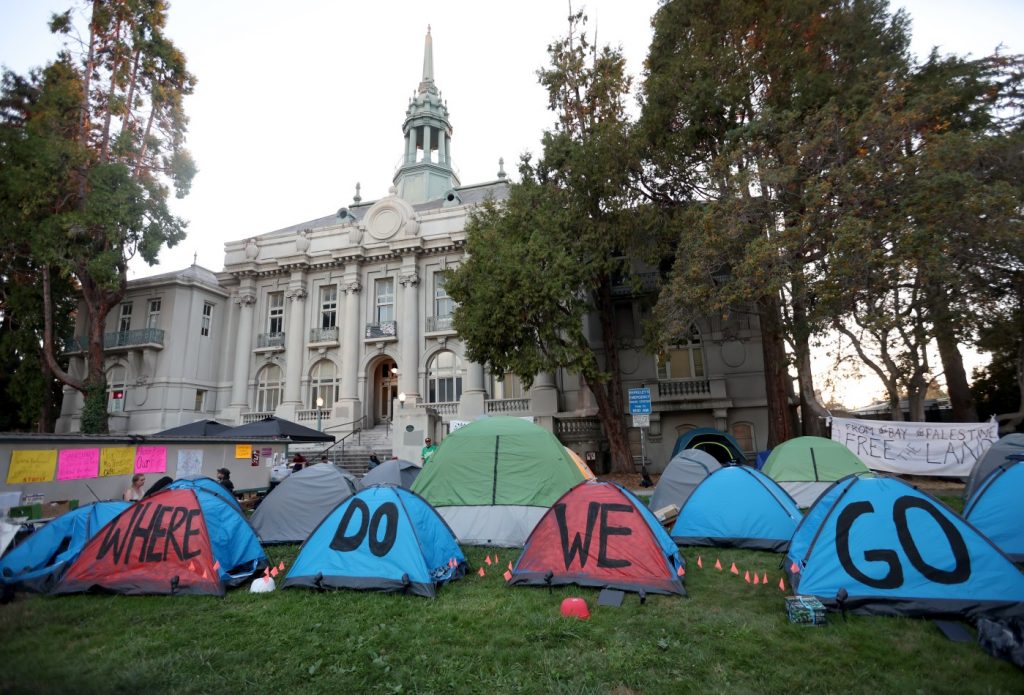BERKELEY — Tents and canopies now cover the lawn of Berkeley’s Old City Hall, forming an encampment in center of the city to protest a new policy allowing encampment sweeps without offering shelter.
The selection of a site near the Berkeley Police Department, City Hall and the Martin Luther King Jr. Civic Center Building was intentional, homeless advocates say, and the encampment has only grown since tents first started popping up on Sept. 28.
Ian Cordova Morales, president of the nonprofit Where Do We Go Berkeley and a formerly unhoused Berkeley resident, said protestors did not initially expect the encampment to last more than a few days but the tents have remained in place without disruption from the city.
Maceo Clardy, 67, joined the encampment Wednesday after suddenly losing his unit in a senior homeless facility where he lived for a year. Sitting on the steps of Old City Hall surrounded by his belongings, Clardy felt defeated as he watched a city employee set up a tent for Clardy to sleep. Having spent decades on and off the streets, Clardy said all he wants is a place of his own where he can live a clean, quiet life surviving on what little he gets in Social Security.
“I’m tired of being homeless,” Clardy said. “I don’t want to die in the streets hungry.”
Maceo Clardy, 67, waits to move into a tent at a homeless encampment at the old Berkeley City Hall on Martin Luther King Jr. Way in Berkeley, Calif., on Tuesday, Oct. 2, 2024. The camp was established in protest of the city’s recently adopted policy allowing staff to clear encampments if they’re deemed to pose a risk to public safety. (Jane Tyska/Bay Area News Group)
Maceo Clardy, 67, moves into a tent at a homeless encampment at the old Berkeley City Hall on Martin Luther King Jr. Way in Berkeley, Calif., on Tuesday, Oct. 2, 2024. The camp was established in protest of the city’s recently adopted policy allowing staff to clear encampments if they’re deemed to pose a risk to public safety. (Jane Tyska/Bay Area News Group)
Yesica Prado, a journalist and advocate who’s homeless herself, said she has been staying at the site to provide support. Part of the reasons people have remained, she said, is because they feel safe and cared for. Like Cordova Morales, Prado was also surprised they hadn’t been pushed out of the site known for political demonstrations.
The encampment was established just days after councilmembers codified into law a new policy committing the city to offering housing “whenever practicable,” but permits city workers to clear encampments without providing shelter if city officials determine the site poses a fire hazard, imminent health hazard or public nuisance, or is in dangerous proximity to traffic, construction zones or utility work.
Advocates with both Where Do We Go Berkeley and the recently formed Berkeley Homeless Union say the policy, if put into action, will be an aggressive step toward further traumatizing and harassing the city’s most vulnerable populations. Rather than sweep encampments, Homeless Union representative Gordon Gilmore said advocates would like city officials to meet with them to discuss how to partner on this issue.
While Gilmore said a seat at the table would mean the protest was successful, Where Do We Go Berkeley co-founder and attorney Andrea Henson said reversing the encampment policy is also the goal.
City officials, on the other hand, say the policy, brought forward by Councilmember Rashi Kesarwani, is narrowly drafted to apply to the most extreme cases that pose serious public safety risks to both those living in the encampment and their neighbors.
The policy wouldn’t apply to most homeless residents, said city spokesperson Matthai Chakko, who noted homeless outreach staff hit the streets daily to offer resources and work with each person and their individual needs. The city’s approach and responsibility, he said, is meant to balance the needs of all city residents. So far, no sweeps have taken place.
“We’d like to be judged based on the actions and reality of what we’re doing on the ground,” Chakko said. “We’re all in community together and we’re trying to navigate all those voices.”
Concerns about encampments have grown recently, particularly among businesses operating in Kesarwani’s district, which is home to two of the city’s largest unsheltered communities on Harrison Street and Second Street. The sites are center to a lawsuit filed against the city in mid-September by the owners of Fieldwork Brewing, Covenant Winery, Boichik Bagels, Acme Scenery Company and Aarvaks Heating and Air Conditioning, among other businesses.
The owners claim in the lawsuit that their businesses are struggling because patrons avoid the area where sidewalks are blocked by makeshift shelters and riddled with trash, used needles, combustible materials and human feces. Instances of harassment and vehicle theft have made owners, patrons and employees feeling unsafe, according to the suit.
Instead of filing a lawsuit, Henson said the businesses should have questioned why the encampments have only worsened in recent years and used their power to lobby the city to provide better services to their struggling neighbors.
“This is the beginning of the end of Berkeley. Everything we stand for should be different, should be innovative, should allow free speech, should support people who don’t have a voice,” Henson said.
A chalk message on the sidewalk at a homeless encampment at the old Berkeley City Hall on Martin Luther King Jr. Way in Berkeley, Calif., on Tuesday, Oct. 2, 2024. The camp was established in protest of the city’s recently adopted policy allowing staff to clear encampments if they’re deemed to pose a risk to public safety. (Jane Tyska/Bay Area News Group)
Supplies under a canopy at a homeless encampment at the old Berkeley City Hall on Martin Luther King Jr. Way in Berkeley, Calif., on Tuesday, Oct. 2, 2024. The camp was established in protest of the city’s recently adopted policy allowing staff to clear encampments if they’re deemed to pose a risk to public safety. (Jane Tyska/Bay Area News Group)
Offers have been made to encampment residents, Deputy City Manager Peter Radu told councilmembers when they discussed the new policy for the first time in September. Radu oversees neighborhood services including the encampment response team and said offers for shelter have not been taken up and “desperate” attempts to enforce existing city policies have failed.
Why someone may or may not accept shelter is unique to that individual Henson and Chakko agreed. Visitation, curfew and inspection rules can feel limiting, offers for congregate shelter unsafe and some have developed a distrust of the system. Even if the city wanted to house all of its roughly 900 unsheltered residents, it wouldn’t have enough beds on any given day to do so, Chakko conceded.
Henson, who assisted Radu in cleaning up encampments, acknowledged the model wasn’t perfect but argued the city had the opportunity to collaborate with advocacy groups and nonprofits to improve the approach to an extremely complex issue.
As for the future of the Old City Hall encampment, Prado said they’re preparing to welcome those living on Harrison and Second streets who’ve decided to voluntarily leave the area to get ahead of any possible sweeps.


